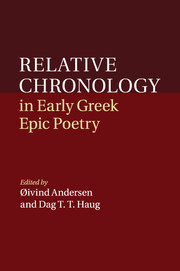Book contents
- Frontmatter
- Contents
- Notes on contributors
- Preface
- Abbreviations
- Introduction
- Chapter 1 πρῶτόν τε καὶ ὕστατον αἰὲν ἀείδειν
- Chapter 2 Relative chronology and an ‘Aeolic phase’ of epic
- Chapter 3 The other view
- Chapter 4 Late features in the speeches of the Iliad
- Chapter 5 Tmesis in the epic tradition
- Chapter 6 The Doloneia revisited
- Chapter 7 Odyssean stratigraphy
- Chapter 8 Older heroes and earlier poems
- Chapter 9 The Catalogue of Women within the Greek epic tradition
- Chapter 10 Intertextuality without text in early Greek epic
- Chapter 11 Perspectives on neoanalysis from the archaic hymns to Demeter
- Chapter 12 The relative chronology of the Homeric Catalogue of Ships and of the lists of heroes and cities within the Catalogue
- Chapter 13 Towards a chronology of early Greek epic
- Bibliography
- General index
- Index locorum
Chapter 5 - Tmesis in the epic tradition
Published online by Cambridge University Press: 05 January 2012
- Frontmatter
- Contents
- Notes on contributors
- Preface
- Abbreviations
- Introduction
- Chapter 1 πρῶτόν τε καὶ ὕστατον αἰὲν ἀείδειν
- Chapter 2 Relative chronology and an ‘Aeolic phase’ of epic
- Chapter 3 The other view
- Chapter 4 Late features in the speeches of the Iliad
- Chapter 5 Tmesis in the epic tradition
- Chapter 6 The Doloneia revisited
- Chapter 7 Odyssean stratigraphy
- Chapter 8 Older heroes and earlier poems
- Chapter 9 The Catalogue of Women within the Greek epic tradition
- Chapter 10 Intertextuality without text in early Greek epic
- Chapter 11 Perspectives on neoanalysis from the archaic hymns to Demeter
- Chapter 12 The relative chronology of the Homeric Catalogue of Ships and of the lists of heroes and cities within the Catalogue
- Chapter 13 Towards a chronology of early Greek epic
- Bibliography
- General index
- Index locorum
Summary
The phenomenon and its place in the epic kunstsprache
It is a characteristic feature of Greek epic diction that compound verbs, which would be integral words in classical Greek, can be split by so-called tmesis. Consider the following example:
τὸν καὶ Μηριόνης πρότερος πρὸς μῦθον ἔειπε (Il. 13.306)
It is obvious that in this line, πρός does not form a prepositional phrase with μῦθον. Rather, it belongs with ἔειπε and forms what we from the standpoint of classical Greek usage would call a compound verb. And still, this compound verb is discontinuous, because the poet has chosen to separate the verb and the particle. We can tell that the poet chose this version and did not simply follow the constraints of the metre, since it would be easy to compose the same line without separating πρὸς and ἔειπε:
∗τὸν καὶ Μηριόνης πρότερος μῦθον προσέειπε
It could even be said that version (2) is prosodically preferable, since Il. 13.306 as given by our manuscripts violates Wernicke's law in having a fourth biceps which is long by position. But of course, it is likely that Ionic πρός has here replaced Aeolic ποτί, and that the verse had a resolved fourth biceps in the original version.
Besides illustrating tmesis, this example shows the importance of preference hierarchies in the study of the Homeric dialects. As we know, Homer prefers Ionic forms to Aeolic ones, except when the latter are metrically necessary. Thus, the text has the Ionic form πρός which gives a correct, though slightly irregular, hexameter. The mere coexistence of Ionic πρός and Aeolic ποτί (as well as numerous other dialectal doublets) in Homer is less important than the fact that there is a preference hierarchy which we can give a historical interpretation in terms of phases in the evolution of the epic diction: πρός is preferred whenever the metre allows it, so it is the form of the later generation of poets.
- Type
- Chapter
- Information
- Relative Chronology in Early Greek Epic Poetry , pp. 96 - 105Publisher: Cambridge University PressPrint publication year: 2011
- 3
- Cited by



